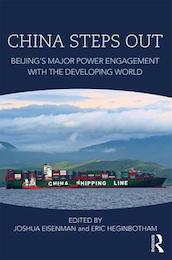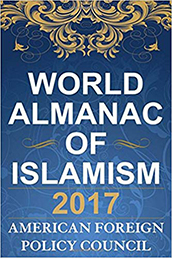China Reform Monitor: No. 1313
Is Beijing playing ball on Iran?;
Chinese telecom makes inroads into Nepal
Is Beijing playing ball on Iran?;
Chinese telecom makes inroads into Nepal
Whitewashing Stalin's purges;
Soviet nostalgia rears its head anew
Russia digs in in Syria;
Expanding the definition of "
foreign agent"
No one would call Russia's government and budgetary bureaucracy particularly nimble, nor its defense industry particularly advanced. Certainly, it trails Western economies in such key areas as communication equipment, microelectronics, high-tech control systems, and other key technologies. But in certain aspects of the field of unmanned military systems, Russia may be inching ahead of its competition in designing and testing a wide variety of systems and conceptualizing their future use.

China Steps Out analyzes and explains China’s strategies in Southeast Asia, Central Asia, South Asia, Africa, Middle East, and Latin America, and evaluates their effectiveness.
When Great Britain told the United States in February of 1947 that it could no longer protect Greece and Turkey, President Harry Truman and his top aides realized that America would have to step up to protect freedom or cede the Mediterranean and maybe Europe and other regions to the Soviets.
The Russian threat to NATO connectivity;
In post-conflict Syria, the advantage goes to Russia
The recent protests in Iran may be petering out, but the White House is ramping up its response to them. Last week, in tandem with his most recent decision to prolong the controversial 2015 Iran nuclear deal for another three months, President Trump opened a new front against the Islamic Republic by levying fresh human rights sanctions on a number of key regime figures and institutions.
It now appears that Germany, after long negotiations has a new and functioning government
The Kremlin takes aim at Khodokovsky's political legacy;
NATO seeks to deter Russia in cyberspace
The announcement last week by Rep. Ed Royce (R-Calif.), the powerful chairman of the House Foreign Affairs Committee, that he plans to resign at the end of his current term in office will unquestionably have enormous ramifications for the shape of U.S. foreign policy toward Syria, Ukraine, North Korea and Iran, as well as a host of other topics on which the congressman has distinguished himself during his eleven terms in office. But Royce's impending retirement will be felt in another area as well: that of U.S. public diplomacy.
A warning to Taipei... and Washington;
China eyes deeper engagement in Southwest Asia
New anti-terror restrictions foreshadow squeeze on foreigners;
The PLA deploys in Doklam
Nationalist activism on the rise;
Is Russia really eyeing the exits in Syria?
Recent events across the Middle East put the lie to one of the foreign policy establishment's most enduring tenets of conventional nonsense: that Israeli-Palestinian peace is key to greater regional peace and stability.
Recent foreign policy moves by the Trump administration disclose a pattern of thought and action that merits being seen in its totality. Towards the end of 2017 the administration released a vigorous national security strategy that not only labeled China and Russia as adversaries but also “took no prisoners” in asserting that the U.S. would act vigorously against challenges.
Will Iran's pro-democracy protests last? As the uprisings that have unexpectedly swept across the Islamic Republic approach their second full week, that's the question on the mind of policymakers in Washington.
These are heady days in Iran. For more than a week now, thousands of Iranians have rallied publicly against their government, demanding accountability, transparency and an end to the repressive clerical status quo. In the process, they have presented Iran's radical theocratic regime with one of the most profound challenges to its authority since the 1979 Islamic Revolution.
The continued civil unrest in Iran raises the possibility of dramatic political changes in the Islamic Republic.
Chinese spies set their sights on Germany;
New modes of surveillance hit Xinjiang
No more foreign eyes on Russia's legislature;
Russia banned from 2018 Games
Anyone hoping to leave the turbulence of 2017 in the past will be in for a rude awakening. While we can’t know for certain what will unfold in the year to come, observable trends in several countries, including the U.S., give us a glimpse of what to expect in 2018.
Could we see a new Iranian revolution in 2018? For nearly a week now, tens of thousands of Iranians have taken to the streets in various cities throughout the Islamic Republic in the largest mass demonstrations of their kind in nearly a decade. In the process, they have raised the tantalizing possibility that we might in fact be witnessing a second "Persian Spring."

Now in its third edition, The World Almanac of Islamism is the first comprehensive reference work to detail the current activities of radical Islamist movements worldwide.
Iran's increasingly blue-water navy;
China expanses its economic footprint in Iran;
Exporting the Basij model;
Iranian cultural censorship goes global
President Donald Trump's new National Security Strategy codifies what has already been a noteworthy shift from his predecessor's worldview. It is the difference between "leading from behind" and actually leading.
Fear and loathing (of the West) in Moscow;
The Kremlin courts Cairo for military basing
Beijing slaps new regulations on the practice of Buddhism;
China eyes new Central Asian rail link
Next year's NATO summit, slated to take place July 11-12 in Brussels, will clarify just how serious the member states are about recommitting to collective defense. The assembled heads of state will also be in a position to assess how effectively and swiftly the alliance and its individual members are implementing key decisions taken last year at the 2016 Warsaw summit and the Brussels "mini-summit."
Ulyukayev in the dock;
A separate internet for the BRICS?
This week, President Trump formally unveiled his National Security Strategy. Much has been made of the Trump administration's ability to introduce this document (something required by Congress since the 1986 Goldwater-Nichols Act) in the first year of its first term, and for good reason. Trump's predecessors often struggled to articulate a coherent path forward on national security, and none have done so so quickly.
Earlier this week, in a major address in Washington, DC, President Donald Trump formally unveiled his administration-s new national security strategy. That document - the first of its kind since 2015 - lays out a compelling and fundamentally different vision of American security from the one that dominated during the Obama era.
Start-up working on floating city prototype;
China's plan to reengineer Tibet's environment;
Crisis in Lake Chad basin;
Glacial melt provides Peru with a new water source...for now;
The forecast for global famine
Russia's Ukrainian war machine;
Disinformation targets trust in British public health
Please use this link to reference the Tables in the November 2017 Defense Dossier Future of War issue article Directed Energy Weapons and Modern Warfare.
Please use this link to reference the Tables in the November 2017 Defense Dossier Future of War issue article Emerging Technology and Security - Looking to the Future.
"The first thing we do," proclaims one of the characters in "Henry VI," Shakespeare's famous play about palace intrigue, "let's kill all the lawyers."
Over the ages, the phrase has become ubiquitous - and synonymous with popular disdain for what is widely seen as an elitist, out-of-touch profession. Yet today, the expertise of legal professionals is desperately needed to help the U.S. navigate the emerging geopolitical discipline known as "lawfare."
Russia plans Arctic energy monopoly;
A peace process for Syria?
Hypersonic weapons enable global strike capability;
Dreaming of invisibility;
The brewing debate over BCI;
Naval iron dome reaches IOC;
Russia's push for an independent internet directory
A nuclear accident after all, perhaps;
The Kremlin gears up for war with Google
Russia's Olympic dreams in peril;
Shilling for Syria at the UN
With respect to Afghanistan, the United States, Europe, Japan, South Korea and the major international financial institutions are all caught in a time warp. Dating back a century and a half, this distortion today impedes Afghanistan's development as a normal country. No less, it helps isolate the other countries of Central Asia from a nearby major market, the Indian subcontinent and Southeast Asia, and pushes the other countries of Central Asia into a one-sided relationship with their former imperial overlord, Russia. It's time to correct this long-standing mistake.
Over the last five years, the Russian Federation has made great strides in designing, testing, evaluating, and fielding a variety of unmanned military systems, including land, air, and sea-based models. Russian media is full of announcements and analyses of the use and specification of what I call red robots, while Russia's foray into Eastern Ukraine and Syria afforded Moscow a rare opportunity to field and operate such machines in combat
Deepening tensions over RT designation;
A lucrative Mideast arms market
Since the Black Sea and its littorals have become contested zones between Russia and the West, it behooves us to think cogently about U.S. interests in the equally important Caucasus and how to defend them. Our vital interests are the same as the 1990s, even taking into account major changes in the regional and global strategic environment. We want these states to remain independent, enjoy real sovereignty within their treaty-defined borders, remain at peace with each other and be open to international economic markets.
The FBI has historically had a well-earned reputation for competence and integrity. The American people deserve no less when it comes to extraordinary investigations that touch the highest levels of government. Justice demands that these matters be pursued with the utmost honesty, probity and impartiality. However, evidence is emerging that special counsel and former FBI director Robert Mueller’s investigation of alleged Russian interference in the 2016 election, as well as the Hillary Clinton email investigations, have been fatally compromised by naked politics.
On Wednesday, President Donald Trump announced that the United States officially recognized Jerusalem as the capital of Israel. "This is nothing more or less than a recognition of reality," he said. "It is right thing to do. It has to be done." He also said the U.S. will begin the formal process of moving the American embassy from Tel Aviv to the Holy City.
A new nuclear disaster?;
Ceding the initiative on Syria
Boko Haram: Down, but not out;
Dutch fears of female Jihadism;
The Afghan battleground;
Europe's new worry: Balkan radicalization;
Testing Saudi Arabia's new approach
China's cyberforce set to surge;
The Marines embrace additive manufacturing;
How coal may fuel a defense tech boom;
A facelift for the U.S. EW technology;
Those other directed energy weapons